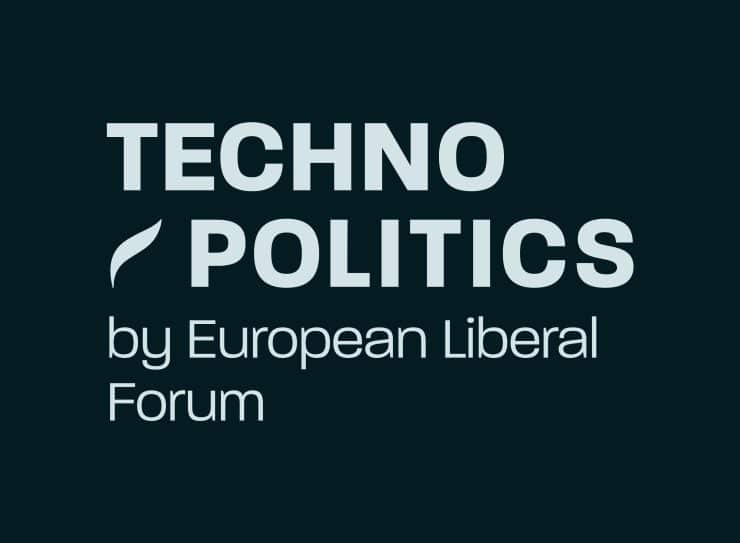20 Nov 2024 | 1:00 pm - 8:00 pm (CET)
Arts 56, Brussels
The third annual Techno-Politics Forum is a conference organised by the European Liberal Forum.

New technologies have added value to civilisation, improving and even lengthening our lives. Already, new technologies are shaping the way we live, and new technologies are appearing before our eyes as more effective methods of communication are invented, tested, and implemented. Europe is at a critical juncture: on the one hand, the digital transition offers unprecedented opportunities. On the other hand, this must be supported by intelligent policy choices. Techno-Politics by the European Liberal Forum creates a bridge between the tech industry, academia, and policymakers. It represents an important step towards this new future-oriented way of thinking that considers policymaking a tool to create a link between technology and the individual and support our digital future.
The Techno-Politics Forum creates a community around the crossover between technology, politics, and sustainability. Once again, we’re gathering top expert policymakers, representatives of EU institutions, industry, and civil society representatives to discuss the digital agenda after the 2024 European elections.
13:00 – 14:00 Book L(a)unch
Lunch & book presentation – Digital technology and liberal values by Telders Stichting
13:00 – 18:00 Techno-Politics Expo Area
14:00 – 14:10 ELF welcome
14:10 – 14:30 Keynote Speech on Generative AI and the Economic Opportunity in Europe
14:30 – 15:30 Panel I – Politics and democracy in the age of robots, disinformation, mass surveillance and post-truth
Democracies and democratic procedures have proven to be the cornerstone of our modern societies. Yet, in an interconnected world, societies are entangled by a flow of information, astonishing technological advancements, and an ever-greater conceptualisation of cyberspace. Information is shared from network to network; this virtual domain shapes our understanding of the world, changing costumes, cultures, and institutions. Politics has always struggled to keep up with technological developments, but democracies must equip themselves with new instruments to tackle the challenges of the digital age.
What is ‘truth’ in the digital age? Which creative destruction will we witness in the upcoming years? Are our democracies resilient enough to the challenges posed by the extended domain of cyberspace?
Speakers:
Moderator: Francesco Cappelletti, Senior Fellow, European Liberal Forum
15:30 – 15:45 Coffee break
15:45 – 16:45 Panel II – Techno-Sustainability: Energies of the past, energies of the future
In this panel, we will explore the dynamic evolution of energy policies in Europe, focusing on the transition from traditional energy sources to cutting-edge sustainable technologies. As Europe stands at the forefront of these global energy transitions, we will discuss the integration of renewable energy solutions into the European energy grid.
Emphasis will be given on the concept of techno-sustainability, highlighting how emerging technologies like smart grids, energy storage systems, and green hydrogen are reshaping the future of European energy landscapes. The discussion will also cover the role of EU policies in promoting sustainable energy and achieving carbon neutrality while identifying the challenges and opportunities for innovation and investment in Europe.
Speakers:
Moderator: Dr Antonios Nestoras, Deputy Executive Director, European Liberal Forum
16:45 – 17:00 Coffee break
17:00 – 18:00 Panel III – The ‘AI’ momentum: is it a meteor or a satellite? Implications for education, human rights and society.
The discourse surrounding AI is far from simplistic; indeed, it encompasses a set of considerations. This includes exploring its applications, programming and codes, intricate algorithms, rights and privacy issues, and even philosophical considerations. As AI is in everyone’s hands, we must adopt a pragmatic approach towards embracing this technological innovation. Thus, without falling in love with technology, engaging in discussions about its role in our future is essential. Whether AI is akin to a meteor or represents a more enduring presence in our future, like a satellite, its impact and implications warrant careful examination.
To AI or not to AI? What is going to change in our lives with AI? Are we going to work less and smarter? Is there a trade-off between security and privacy? Where is AI going?
Keynote (10 minutes): Hugues Bersini, FARI Insitute, Lead Scientific Advisor @ ULB and Head of IRIDIA
Speakers:
Moderator: Alva Finn, Executive Director, European Liberal Forum
18:00 – 18:45 Cross-party keynote panel: Technologies VS Europe in the next five years
What are the political priorities, challenges, and alignments in the digital domain for the next five years?
Speakers:
Moderator: Javier Espinoza, Financial Times
18:45 – 21:00 Techno-Apéro: Networking Cocktail
21:00 End of the event